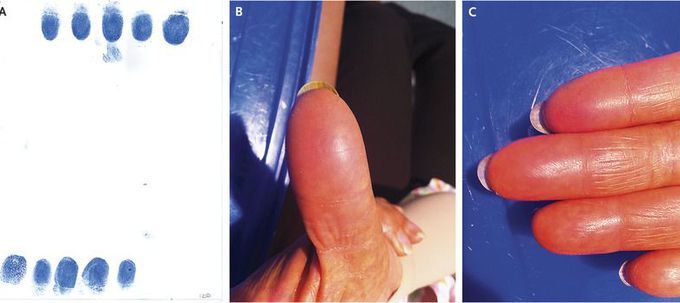


Loss of Fingerprints
A 65-year-old woman with stage IV breast cancer presented after being denied authorization to perform a banking transaction because her fingerprints were unrecognizable (Panel A). For 3 months, she had undergone treatment for triple-negative breast cancer (a tumor characterized by the lack of expression of estrogen receptor, progesterone receptor, and human epidermal growth factor receptor type 2 [HER2]) with capecitabine and bevacizumab. During the first cycle, grade 1 of the hand–foot syndrome (palmar–plantar erythrodysesthesia) developed and was successfully treated with topical agents. The hand–foot syndrome is a side effect of certain chemotherapeutic agents that is characterized by redness, swelling, and pain on the palms of the hands or soles of the feet. After the third cycle of chemotherapy, the symptoms worsened, with limitation of self-care activities. Positron-emission tomography–computed tomography revealed a 50% reduction in metabolic activity of the lung metastases; capecitabine administration was delayed and subsequently continued at a reduced dose. The patient had no further acute toxic effects, but the fingerprints of her thumb (Panel B) and fingers (Panel C) were erased. We provided her with a letter explaining that the chemotherapy was responsible for her lack of fingerprints.

